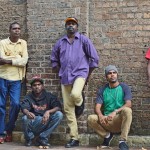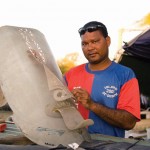A huge groundswell of community support has ensured a further 12 months funding for NITV, but the battle isn’t over yet. Tanya Denning takes us inside the campaign to keep NITV on the box.
DV: A further 12 months funding for NITV is great news, but obviously not what you were hoping for, where does it leave things for NITV?
TD: Well, it’s a obviously a huge sigh of relief and a welcome decision, they pretty much left it until the 11th hour, so it was a really hard way to manage the channel. From the general feedback and audience reactions we were getting, we were thinking we had done the right thing and how could they not support us? But a decision hadn’t come though so as far as managing and keeping producers and other stake holders interested in us it was very challenging.
So once a decision came through it was welcomed, but obviously, it wasn’t what we were after, but what it means is all Indigenous broadcasting is being reviewed. The Government is still wanting to see what the future is and NITV welcomes being involved in the review and is happy to help in what ways it can to inform the review, and obviously, looking forward to continually improving Indigenous broadcasting for not just the communities and our people but for all Australians.
DV: Obviously you weren’t expecting the decision to come through so late in the picture, how dire did things get?
TD: I think a lot of people were taking it for granted that NITV was going to be around, you know? I guess they’dessentially forgotten that we were only ever a trial and we only came about through the sale of Telstra, and obviously we had fought for a good 25 years as Indigenous people to get NITV, and the Royal Commission into Aboriginal Deaths in Custody had a huge impact as part of it’s findings was to ensure broadcasting was placed in Indigenous hands.
So once we got ourselves onto Foxtel and Austar, I think we grew and our programming was looking really hot and we were really starting to get the channel improving compared to its early days and I think a lot of people took it for granted.
But yet behind the scenes we had no word at all, and we were trying to get that certainty, not just for our internal running of the organisation but also for our production sector that we had worked so hard in building. We took enormous risks in all sorts of people to produce television that they’d never produced before. We had a lot producers, directors and film makers that had done a certain genre, maybe just one off programming, but what we wanted at NITV was to have Indigenous people making series television, broadcasting, working in the technical side, putting a channel to air and having control of information, so we had to make a decision.
DV: Tell us about the public campaign to keep NITV on the TV, how did it get started?
TD: There was a review towards the end of 2009, and I don’t think one of our biggest stake holders was really looked at, and that’s our audience.
I think the review looked at producers and other people who had invested interest in NITV but our number one stake holder, the audience, Indigenous people, I don’t feel they were really questioned and given an opportunity to give their answer, so we thought lets run a campaign, if you want to save us we actually need to hear it, and just like your local milk bar down the road, you only worry about it once it’s not there, so we needed people to show their support now before a decision was made.
So there was huge momentum, we didn’t even rush internally on NITV, we just sort of asked people to send in their support casually and then we thought, ‘well, time’s still ticking away and we haven’t heard anything’, so then we put the countdown clock on our website and we put promos on air to say, ‘hey guys, we actually do really need your suppose because the government has not guaranteed a future for NITV, and the moment we had our CEO go on to Marngrook and Barefoot, our two most successful live shows, people really started to come in from all walks of life, not just saying they wanted to keep seeing these shows on air, but also telling us what NITV has done to their life’s, how they’ve gotten to know Indigenous people, and even Indigenous people saying how they’ve got to know themselves better.
So now that we have started this momentum of ownership for all Australia it’s pretty amazing. One of our former board members said to me once it not about wanting NITV anymore, it’s about needing NITV. And also, for the staff, we’ve had to deal with so many stakeholders and needing to be so many things for different people, from regional, remote, bush mob, city mob, you know? We had to be everything to everyone, and actually just getting all this support coming thought has really strengthened us, we’re running on the smell of an oily rag so it’s been really nice to get that support.
DV: NITV has made some huge strides since its launch three years ago, what achievement are you most proud of?
TD: There are quite a lot of elements that I’m proud of, but I think one of areas where we have let ourselves down is the fact that we haven’t sold ourselves enough. Because we have achieved so much in such a small amount of time, like other broadcasters, we really had to not just do as well as the others, we had to do better, it’s one of those typical things where you need to not just prove yourself but go beyond.
We’ve broadcast live programs from areas where you can barely get telephone coverage let alone think to take an OB van out to a community, and what it means to the locals is amazing, but what it also means to general Australia is they get to see it and be a part of it.
So how we’ve opened up everyday Australia into our homes through NITV has been very rewarding, and behind the scenes, it’s really important to make note that its Indigenous people running the ship. I came from community radio, got into journalism and I’ve gone up, and now I’m actually managing, I put the channel to air, and my team of programmers, schedulers, technical, they are all Indigenous, we have two non-Indigenous staff which is great, but the fact is you will barely find a scheduler or programmer that’s Indigenous outside of NITV, and what we’ve done is by going through Foxtel, the way that we run the channel was very professional and the team have been exposed to the best in the industry which means that we keep all of our products at a really high standard, but at the same time, we’ve engaged with remote and regional communities where they might not have access to a lot of equipment, so we want to make NITV accessible for everyone.
I think we’ve had on average about 50 staff that run the channel or work in the news team, and another thing I think is absolutely worth noting is the fact we have an all Indigenous news and current affairs team, to have a national news bulletin in general is an achievement, there’s not many of those in Australia anyway, getting that service up and running, when we got information back from the review and our feedback it said that 98 percent of our audience absolutely trust our news service, that’s a huge achievement and you will rarely find that at any other broadcaster, so that’s something worth being proud of.
I’m also really proud that we have taken risks with new film makers and new Indigenous television makers and production companies. At the end of the day they’ve come through with the goods, so that’s something. ABC and SBS are going on about how great they are with their Indigenous programming, but they would never have taken the risks that we have and now they’re going to those people that we’ve given that leg up to I guess.
DV: How would you sum up the last three years, it obviously been a lot of hard work?
TD: To sum it up, I was one of the first employed, and still hanging in there. It’s been a hard journey but it’s been a very rewarding journey, and if there’s one word that sums it up, its passion, passion from the staff internally and also from a lot of our supporters. There might have been frustrations along the line, but they stood by us and we stood by them, and I guess it’s been a passion. And generally, when I think of these last three years, it’s been a roller coaster, but we just see the bigger picture and the fact of having an Indigenous controlled television service for Australia, the potential is huge. I just got back from a world Indigenous television broadcasting network and we have great relationships with other countries that want to exchange more information with us, and there’s potential there to be up with the big boys, and also, in just three years we’re now the sixth largest television service available in Australia, so were available to more than eight million Australians and we worked really hard to get that. So that’s been something else I should have mentioned about being proud about. I think it’s something so important for all Australians, it really is bridging the gap, and I guess that’s why a lot of people were thinking, yeah it’s a given that the government will renew us, but it wasn’t.
DV: With only 12 months further funding announced at this stage, how important is it for the public campaign to continue?
TD: Well we’re not free to air, a lot of Australian viewers can’t get us and can’t afford Foxtel and obviously we’re only on a trial service in Sydney which we could lose, you know? We’ve basically given advice to Senator Conroy for him to instruct ACMA to add us on the community TV spectrum which means we become free in five major cities around Australia.
Ideally it would be great to not have to struggle to get free to air, so obviously the campaign must continue, we need to keep the feedback coming in and also for me with programming it’s great for me to see what audiences like, what they want to see on the TV, so its great getting that continual feedback coming in. But as far as the campaign, the journey is not over, its only 12 months but I guess it’s going to be very hard to switch us off after the next 12 months, and it mean e can really get our systems and our operations really happening. We’ve only been on Foxtel for the past 12 months, we’ve had a lot of internal systems to clean up and we want to get out to communities, we want to get more language content on TV, and the next 12 months has really given us an opportunity to tighten our ship.
I don’t want to say it’s only 15 million dollars, it’s still a lot of money, but in TV land that’s sucked up pretty quickly, it’s only a section at ABC, so we still have to be really strategic with how this money is spent, how we engage with the production sector, but it’s good news for everyone that we did get the 12 months but we still need the support.
DV: Do you think the overwhelming display of community support was a critical factor in the final decision to refund the station?
TD: Absolutely, I think with our release, one of the first things out CEO Pat turner said was this further 12 months funding was because of our supporters and the audience, and it was because of our campaign, and that was when the penny really dropped with the department and the Government that yes, we have gotten into the homes of Australians and we would not have got this continued funding if it wasn’t for that. So we absolutely thank our audience for getting behind us and believing in us and helping us to keep going for at least another year, but we obviously still need their support, so keep spreading the word.






Comments are closed.